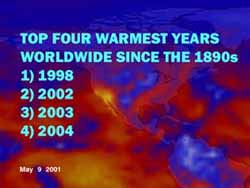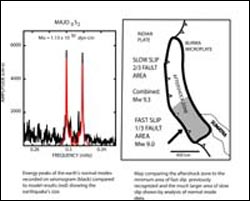A new study of climate in the Northern Hemisphere for the past 2000 years shows that natural climate change may be larger than generally thought. This is displayed in results from scientists at the Stockholm University, made in cooperation with Russian scientists, which are published in Nature on 10 Feb 2005.
The most widespread picture of climate variability in the last millennium suggests that only small changes occurred before the year 1900, and then a pronounced warming set in

Last year was the fourth warmest year on average for our planet since the late 1800s, according to NASA scientists.
To determine if the Earth is warming or cooling, scientists look at average temperatures. To get an “average” temperature, scientists take the warmest and the coolest temperatures in a day, and calculate the temperature that is exactly in the middle of those high and low values. This provides an average temperature for a day. These average temperatures are then ca

Northwestern University seismologists have determined that the Dec. 26 Sumatra earthquake that set off a deadly tsunami throughout the Indian Ocean was three times larger than originally thought, making it the second largest earthquake ever instrumentally recorded and explaining why the tsunami was so destructive.
By analyzing seismograms from the earthquake, Seth Stein and Emile Okal, both professors of geological sciences in Northwestern’s Weinberg College of Arts and Science
While nothing can undo the devastation from the massive tsunami that recently struck in Southeast Asia, lives can be saved in the future if scientists can rapidly characterize the earthquakes that cause tsunami. The quick response of the Global Seismographic Network to the 26 December 2004 Sumatra- Andaman earthquake offers clear opportunities to reduce the amount of time before an emergency response and assistance could be dispatched to a similarly afflicted area in the future.
The British Geological Survey (BGS) announced today that they will start sending scientists to the affected regions next Monday. The scientists will help with the rebuilding process and address immediate problems such as contaminated freshwater supplies.
Following a symposium in Thailand (31 January –1 February), David Ovadia, head of the BGS international team, said, ‘What we got out of the conference was a consolidated, agreed list of scientific activities that the affected countr
Discovery could be used in design of robotic explorers
A study led by Princeton biologists has revealed a remarkably simple mechanism that allows flocking birds, schooling fish or running herds to travel in unison without any recognized leaders or signaling system.
The finding, published in the Feb. 3 issue of Nature, helps settle age-old questions about how animals coordinate their actions. Previously, scientists had looked for subtle signals or other explicit systems that